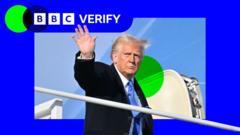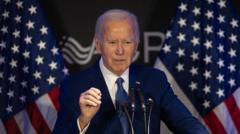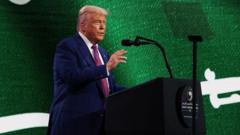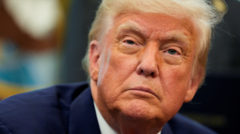President Trump's meeting with Syria's President Ahmed al-Shara represents the first high-level dialogue between the nations in 25 years and symbolizes a dramatic change in U.S. foreign policy. This development could lead to the normalization of Syria's relations with Israel and the promise of economic rehabilitation.
Trump’s Historic Meeting with Syria’s New Leader Marks Major Shift in U.S. Policy

Trump’s Historic Meeting with Syria’s New Leader Marks Major Shift in U.S. Policy
In an unprecedented move, President Trump meets with Syria’s President Ahmed al-Shara, signaling a new direction for U.S.-Syria relations following the recent lifting of sanctions.
President Trump met on May 14, 2025, in Riyadh, Saudi Arabia, with Syria's newly inaugurated leader, President Ahmed al-Shara. This historic encounter marks the first dialogue between leaders from the U.S. and Syria in a quarter-century, coinciding with Trump's announcement to lift sanctions on Syria. The meeting, lasting approximately 30 minutes, unfolded just before Trump's summit scheduled with six Gulf leaders, representing a potential turning point in U.S. foreign policy aimed at reintegrating Syria into the international community.
The White House emphasized that Trump advised al-Shara on utilizing this “tremendous opportunity” to implement historic reforms in Syria, including normalizing relations with Israel and expelling foreign militants. President Trump's invitation for the meeting came from Saudi Crown Prince Mohammed bin Salman, who participated alongside Turkey's President Recep Tayyip Erdogan via telephone.
This notable shift follows al-Shara's leadership role within a rebel alliance that ousted former President Bashar al-Assad in December, asserting that removing sanctions is crucial for Syria's recovery and regional stability. Minister of Foreign Affairs for Saudi Arabia, Prince Faisal bin Farhan, highlighted that these conversations revolved around Syria’s potential and capacity, signaling a readiness for economic revival supported regionally.
President Trump's Middle Eastern tour represents his administration's focus on fostering diplomatic relations and business ventures. The discussions with al-Shara could signal the U.S.’s willingness to end years of diplomatic seclusion for Syria, as U.S. officials indicate a more open approach towards the new Syrian government, contingent on improvements in counterterrorism and humanitarian strategies within Syria.
In related developments, ongoing economic challenges in Syria and the broader implications of regional stabilization remain focal points for both U.S. and Gulf state leaders, pointing towards a collaborative foothold in Middle Eastern diplomacy moving forward.





















